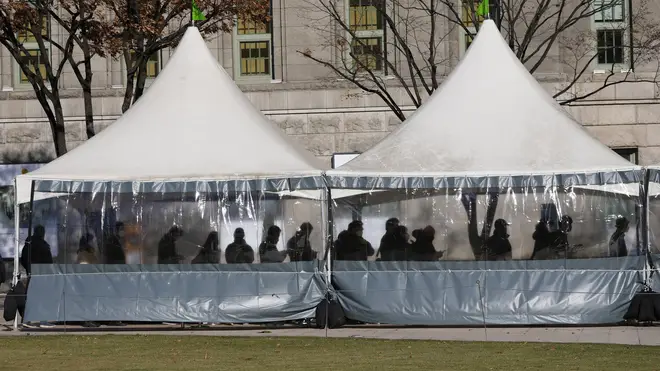
Clive Bull 1am - 4am
1 December 2021, 16:14

South Korea announced it will require all passengers arriving from abroad over the next two weeks to quarantine for at least 10 days.
South Korea has confirmed its first five cases of the new Omicron coronavirus variant in people linked to arrivals from Nigeria.
The Korea Disease Control and Prevention Agency said on Wednesday the cases include a couple who arrived from Nigeria on November 24 and a friend who drove them home from the airport.
The two other cases were women who also travelled to Nigeria and returned to South Korea on November 23.
Health workers earlier said they were conducting genetic sequencing tests on a child of the couple and relatives of the man who drove them home to determine whether they were infected.
Following the confirmation of the Omicron infections, South Korea announced it will require all passengers arriving from abroad over the next two weeks to quarantine for at least 10 days, regardless of their nationality or vaccination status.
The country had already banned short-term foreign travellers arriving from eight southern African nations, including South Africa, starting on Sunday to fend off Omicron.
Officials say the same rules will now be extended to foreigners coming from Nigeria.

The couple who arrived from Nigeria on November 24 was fully vaccinated, but their teenage child and the friend who drove them were unvaccinated, said Choi Seung-ho, a KDCA official.
Park Young-joon, another KDCA official, said the four were not exhibiting serious illness aside from mild respiratory symptoms or muscle pain.
While Omicron’s emergence has triggered global alarm and forced countries to tighten their borders, scientists say it is not yet clear whether the variant is more contagious or dangerous than other strains, including the devastating Delta.
The detection of South Korea’s first Omicron cases came as a Delta-driven surge leaves the nation grappling with its worst wave of the virus since the start of the pandemic.
Wednesday also saw the country’s new daily cases exceed 5,000 for the first time, and the spike in transmissions is pushing hospital admissions and deaths to record highs.
Amid growing fears about overwhelmed hospitals, health experts have urged officials to reimpose stricter social distancing rules that were eased last month to soften the pandemic’s impact on the economy.
KDCA said most of the new 5,123 cases came from the capital, Seoul, and the surrounding metropolitan region, where officials say nearly 90% of intensive care units designated for Covid-19 patients are already occupied.
More than 720 virus patients were in serious or critical condition, also a new high. The country’s fatalities reached 3,658 after numbering between 30 and 50 a day in recent weeks.

The government eased social distancing rules at the start of November and fully reopened schools starting on November 22 in what officials described as the first steps toward restoring some pre-pandemic normalcy.
In allowing larger social gatherings and longer indoor dining hours, officials had hoped that the country’s improving vaccination rates would help keep hospital admissions and deaths down even if the virus continues to spread.
However, health workers are now wrestling with a rise in serious cases and deaths among people in their 60s and older who had either rejected vaccines or whose immunities have waned after being inoculated early in the immunisation campaign that began in February.
The spread has prevented the government from taking further steps to ease social distancing, but officials have so far resisted calls to restore stricter gathering rules, citing economic concerns and people’s fatigue and frustration over extended virus restrictions.
“We cannot retreat to the past by reversing our efforts to gradually restore normal life,” President Moon Jae-in said during a virus meeting on Monday.
Instead, officials are scrambling to speed up the administration of booster shots and are managing the sharing of hospital capacities between the greater Seoul area and other regions with smaller outbreaks to prevent hospital systems from being overwhelmed.
Officials also said they will revamp medical responses so that most mild cases will be treated from home.
Son Youngrae, a senior Health Ministry official, said nearly 12,000 virus carriers were being treated from home as of Wednesday morning.
The Korean Federation of Medical Activist Groups for Health Rights, which represents doctors and health workers, issued a statement criticising the government for putting lives at risk with its “ill-prepared” policies to restore normalcy.
It said the government should restore stricter social distancing rules and procure more beds from private hospitals for Covid-19 treatment.
“While the government says it will focus on raising vaccination rates, that cannot be an immediate solution to the current crisis as it would take time for improved vaccination rates to take effect,” the group said.
“Saying that home treatment will be standard (for mild cases) is just a way of rationalising the current situation where a shortage in hospital beds has forced many virus patients to wait at home. It’s basically a declaration to give up treatment.”